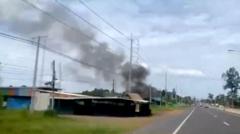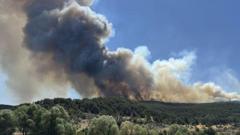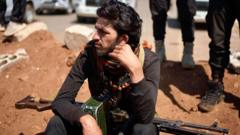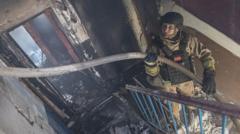Fighting along the Thailand-Cambodia border has escalated significantly in the past few days, with at least 12 Thai fatalities reported, most of whom were civilians. Both nations accuse each other of instigating the violence, which has roots extending over a century. Tensions flared notably in 2008 when Cambodia sought UNESCO heritage status for a contested temple, igniting long-standing disputes. The conflict intensified in May after a Cambodian soldier was killed, leading to border restrictions and troop buildups by both countries. On Thursday morning, conflicting narratives emerged over the conflict's initiation, with each side blaming the other for the gunfire exchange. Despite the urgent situation, leaders express hope for a diplomatic resolution.
Border Battles: Escalating Tensions Between Thailand and Cambodia

Border Battles: Escalating Tensions Between Thailand and Cambodia
Recent hostilities have reignited a century-old border conflict, claiming lives and prompting military escalations.
Article:
Fighting between Thailand and Cambodia has broken out recently along a long-disputed border area, resulting in significant casualties, particularly among Thai civilians. Reports confirm at least 12 deaths, but casualty figures from the Cambodian side remain unclear. The sudden escalation in hostilities has left many questioning the historical grievances that have been simmering between the two nations.
Historically, the tensions between Thailand and Cambodia are not new; they can be traced back to the way borders were established following French colonial rule in the late 19th and early 20th centuries. The situation turned overtly hostile in 2008 when Cambodia attempted to designate the 11th-century Preah Vihear temple as a UNESCO World Heritage Site, a move that enraged Thailand, leading to protests and military confrontations since that time. Sporadic skirmishes over the years have resulted in both civilian and military casualties on both sides, deepening the mistrust.
The latest round of skirmishes appears to have been sparked by events in May when a Cambodian soldier was killed during an encounter. Following that, both Thailand and Cambodia imposed trade sanctions against each other, with Cambodia halting imports of Thai fruits, vegetables, and other goods, as well as restricting crucial services like electricity and internet. Troop deployments along the border surged as both sides prepared for a potentially increased conflict.
Regarding the recent escalation on Thursday, different accounts from Thai and Cambodian officials depict contradictory narratives of who initiated the violence. According to Thailand's National Security Council, Cambodian troops began firing rockets after conducting drone surveillance on Thai forces. Cambodian officials, on the other hand, accused Thai soldiers of breaking an agreement and advancing on the contested temple site before retaliating with gunfire, claiming they were defending themselves.
Calls for a peaceful resolution have emerged from both nations’ leaders, with Thailand’s acting premier emphasizing the need for careful diplomacy. In contrast, Cambodian Prime Minister Hun Manet asserted his country’s right to respond to what it views as armed aggression. Observers suggest that while tensions are serious, there’s historical precedent for rapid de-escalation, despite the current volatile environment.
Travel advisories remain cautious; though fighting is localized, travelers have been urged to remain vigilant, particularly around disputed tourist sites. The situation is complex, and while immediate escalations are concerning, diplomatic solution routes are being explored as both nations navigate this challenging period.
Fighting between Thailand and Cambodia has broken out recently along a long-disputed border area, resulting in significant casualties, particularly among Thai civilians. Reports confirm at least 12 deaths, but casualty figures from the Cambodian side remain unclear. The sudden escalation in hostilities has left many questioning the historical grievances that have been simmering between the two nations.
Historically, the tensions between Thailand and Cambodia are not new; they can be traced back to the way borders were established following French colonial rule in the late 19th and early 20th centuries. The situation turned overtly hostile in 2008 when Cambodia attempted to designate the 11th-century Preah Vihear temple as a UNESCO World Heritage Site, a move that enraged Thailand, leading to protests and military confrontations since that time. Sporadic skirmishes over the years have resulted in both civilian and military casualties on both sides, deepening the mistrust.
The latest round of skirmishes appears to have been sparked by events in May when a Cambodian soldier was killed during an encounter. Following that, both Thailand and Cambodia imposed trade sanctions against each other, with Cambodia halting imports of Thai fruits, vegetables, and other goods, as well as restricting crucial services like electricity and internet. Troop deployments along the border surged as both sides prepared for a potentially increased conflict.
Regarding the recent escalation on Thursday, different accounts from Thai and Cambodian officials depict contradictory narratives of who initiated the violence. According to Thailand's National Security Council, Cambodian troops began firing rockets after conducting drone surveillance on Thai forces. Cambodian officials, on the other hand, accused Thai soldiers of breaking an agreement and advancing on the contested temple site before retaliating with gunfire, claiming they were defending themselves.
Calls for a peaceful resolution have emerged from both nations’ leaders, with Thailand’s acting premier emphasizing the need for careful diplomacy. In contrast, Cambodian Prime Minister Hun Manet asserted his country’s right to respond to what it views as armed aggression. Observers suggest that while tensions are serious, there’s historical precedent for rapid de-escalation, despite the current volatile environment.
Travel advisories remain cautious; though fighting is localized, travelers have been urged to remain vigilant, particularly around disputed tourist sites. The situation is complex, and while immediate escalations are concerning, diplomatic solution routes are being explored as both nations navigate this challenging period.




















